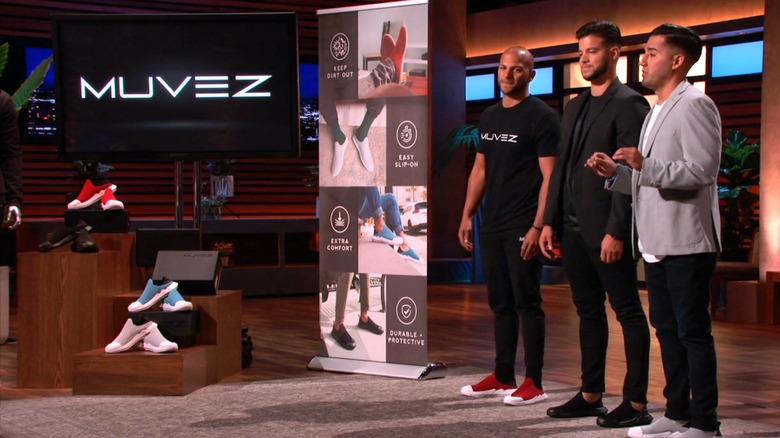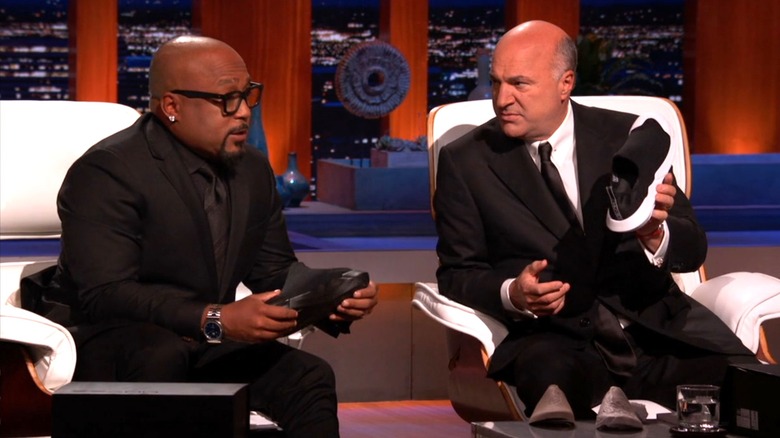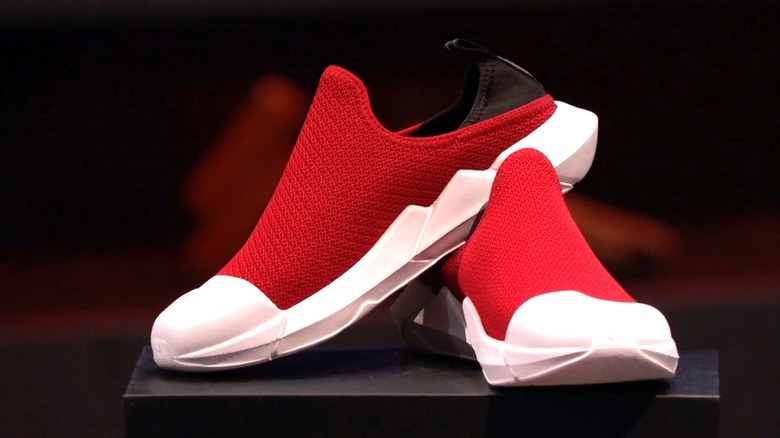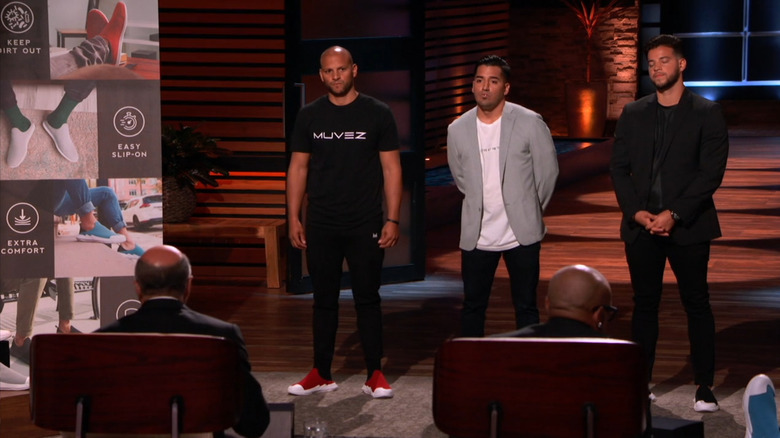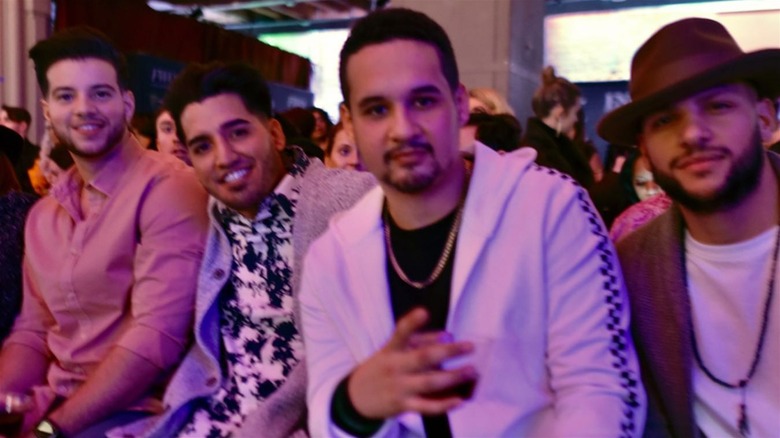Here's What Went Down With Muvez Footwear After Shark Tank
We may receive a commission on purchases made from links.
Muvez footwear began in 2013 as a college project. The company's signature shoe, which features a unique design that turns an indoor slipper into an outdoor shoe, was thought up by co-founder Ryan Cruz when he was tasked with improving an existing product. He modified a traditional slipper to be worn inside and outside and then presented the idea to his fellow co-founder Kevin Zamora. The youngsters started plans to turn the concept into a business, but they abandoned the idea after a teacher told them it would never work. However, three years later, they saw a similar product on the market and decided to launch a business and upgrade their initial idea, making footwear with separate soles designed for indoors and outdoors.
After bringing Ryan's brother Eric Cruz and McMichael Torres onboard, things moved quickly and they caught the attention of the "Shark Tank" producers. "At first when they emailed, we assumed one of our friends was behind it because we were only in business six months," Eric told Kean University. "After that, there were auditions and challenges we overcame. We had a less than 1% chance of making it." But that slim percentage ended in an appearance on the reality show in 2020.
What happened to Muvez on Shark Tank?
Kevin Zamora, Ryan Cruz, and Eric Cruz pitched on "Shark Tank," looking for $200,000 for a 15% stake in Muvez. In the Season 11 episode, which aired in April 2020, the trio showed the Sharks their innovative product in a range of colors and handed out samples. The entrepreneurs seemed impressed when Zamora explained the company had made $73,000 in sales in just a few months, despite a shoestring marketing budget. He also explained why they wanted the hefty investment, telling the Sharks, "The majority of our sales are e-commerce so it goes through our social media channels. What we're doing in the second phase of the business is allowing the customers to buy the outer soles separately."
Kevin O'Leary liked the idea because it wasn't your everyday summer sneaker. "It's different. There's no doubt about it, you walked in here with something we haven't seen before," he said. But it wasn't enough for him to invest. Mr. Wonderful felt their valuation was too high and the footwear market was too unpredictable. Robert Herjavec and Mark Cuban said they weren't fans of the branding, so dropped out too. Lori Greiner said she'd be willing to invest, but only if she could split the risk with another Shark.
That's when Daymond John, who also invested in the "Shark Tank" business Jeska Shoe Company, swooped in. He offered $200,000 but wanted 33.3% equity. "I would be taking you some place to license this," he explained of why he wanted such a high percentage. John also made it clear he wouldn't team up with Greiner, who dropped out. The trio didn't want to give away so much equity, so they worked out a counter-offer, shaking hands with John for 25% of the company in exchange for $200,000.
How did Muvez do after Shark Tank?
Speaking about his "Shark Tank" experience shortly after the episode aired, Eric Cruz told Kean University that Daymond John was the Shark he and his co-founders wanted when they entered the Tank. "It was surreal. As a longtime fan of the show who usually responded to questions posed by the Sharks while watching comfortably on my couch, it was quite the experience," he said. It's no wonder the co-founders were so grateful to the show, as the company got a huge boost from the ABC series. In the three months after the episode aired, Inc reported that Muvez brought in $400,000 — four times its sales in 2019. That success resulted in an honorable good deed from the company, as they pledged $10,000 to the World Health Organization amid the COVID-19 pandemic.
In 2020, Eric told Footwear News that, much like fellow "Shark Tank" company SpiritHoods, the business thrived during the pandemic. The difficult time allowed them to upgrade several aspects of the business. "We don't think of ourselves as the COVID shoe, but a lot of people have discovered us because of what's going on," Eric said. The company improved its warehouse facilities and customer support operations, which meant Muvez could ship out more products in response to increased demand.
McMichael Torres left the team in July 2021, moving on from his social media manager role to work as a web designer and social media manager at Lotto Sport Italia Spa. That didn't seem to slow the company down too much, though. In 2022, Muvez was a top 100 finalist in FedEx's Small Business Grant Contest.
Is Muvez still in business?
Sadly, Muvez ran into trouble following its pandemic boost. At the time of writing, the brand's website is no longer available and its online returns portal remains closed – despite customers claiming some orders have gone unfulfilled. Muvez seems to have moved its operations entirely over to Amazon. However, the company is no longer actively updating its social media accounts, and its final few posts have been flooded with messages from disgruntled buyers.
"If I don't get a response by tomorrow I will need to notify my bank that I was a victim of fraud against your company," a customer commented on the brand's most recent Instagram upload, shared in June 2023. The business last updated its TikTok in April 2024, but that only irritated customers further. "Y'all still exist, right? Because I've tried to contact y'all on IG, text AND email about my order since April 23 and received no response," one person commented.
A Reddit thread was also started in mid-2024 by customers looking to get their money back. "Ordered Muvez shoes and the confirmation email arrived but did not have an order number. I have tried following up on my order for over a month and no one has responded. Tried their website contact us form and it does not send," one user claimed. The lack of transparency has caused the business' reviews to nose dive, plunging to a one-star rating on the Better Business Bureau and a two-star rating on Trustpilot.
Eric Cruz parted ways with Muvez, and the entrepreneurs have other business interests
While Muvez has kept loyal customers in the dark regarding its future, social media offers some insight into what's been going on behind the scenes and the footwear brand's seemingly bleak future. At the time of writing, Kevin Zamora's LinkedIn still lists him as the co-founder and chief marketing officer of Muvez, but he's also listed as the co-founder of two other companies, Eat Well Miami and Fusion Fashion Events. According to LinkedIn, Muvez has been working concurrently on these entrepreneurial projects since 2020.
Ryan Cruz's LinkedIn account states he remains Muvez's co-founder and industrial designer, but he's also worked as a full-time senior graphic designer at Atlas Construction Management since 2019. Eric Cruz ended his stint as director of operations and left the business in February 2022, and he now works as a senior business analyst at an insurance company called Chubb.
Zamora is the only member of the core three co-founders with a public Instagram account, but he hasn't addressed the events surrounding Muvez on his grid. He still links to the company's Instagram account in his bio, but his focus appears to be firmly on Fusion Fashion Events with several posts promoting the company in 2024, but no mention of Muvez.
"Shark Tank" is available for purchase on Prime Video.
